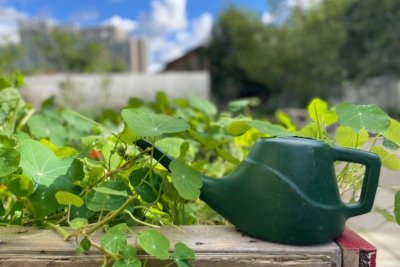Building food resilience from the ground up
Is urban food growing a ‘nice to have’? Or a critical asset to help communities withstand food system shocks? Capital Growth Coordinator Rachel Dring summarises Tim Lang's recent report for the National Preparedness Committee through the lens of civil food resilience.

The recent report by Prof Tim Lang for the National Preparedness Commission, Just in Case: narrowing the UK civil food resilience gap asks the question; "how prepared for food shocks is the UK?" The short answer is, "not very". This report offers a wake-up call for us all. As our centralised, supermarket-dominated food system faces increasing vulnerabilities, the report highlights the glaring omission of food in the UK’s disaster preparedness planning. But it’s not all doom and gloom – whilst Lang lifts the lid on a frightening lack of leadership and investment, he also offers a way forward, calling for diversity and cooperation across the food system, highlighting the essential role of grassroots food projects, and practical steps for how to get there.
We need strong communities not scared survivalists
Despite the severe disruptions to food supplies and access during Covid-19 pandemic, the 2023 National Risk Register only conceives of one direct food impact, that of food supply contamination. In terms of other potential disruption, the current advice to the public is to store 3 days’ worth of food at home. While there are already 7.2 million people experiencing food insecurity in the UK, with people unable to afford to feed themselves for one day let alone to stockpile, we need to be leaning toward community-scale food storage and systems over a “preppers” mentality.
The Resilience Gap
The UK's highly centralised food system, dominated by a few large retailers with tightly optimised distribution networks, is increasingly vulnerable to disruption. While much attention has focused on supply chains, the report argues that insufficient consideration has been given to the preparedness of the public and communities. A truly resilient food system requires not just robust supply chains but also the capacity of communities to "bounce back after shocks."
The Untapped Potential of Urban Food Growing
For community food growers, urban farms, and food and land justice organisations, the report validates what we have long advocated: urban and peri-urban food production offers significant potential for enhancing food security. While urban food growing alone won't feed entire cities, it provides both practical and symbolic value, contributing to horticulture skills, community morale, and local food networks.
Community Food Assets: The Missing Link in Emergency Planning
Perhaps most concerning is the gap identified between civil society food organisations and formal emergency planning structures. Current Local Resilience Forums (LRFs) have no specific food role, and emergency advice often lacks practical food guidance. Community food assets - food banks, community kitchens, gardens, and support services - remain largely unmapped and underutilised in resilience planning.
What can councils do now?
The report's recommendations offer a roadmap for collaboration between community food organisations and local authorities:
Establish Local Food Resilience Committees: Create new structures to map local food supply chains, conduct audits of community food assets, build networks of expertise, and act as early-warning systems.
Map and Strengthen Community Food Assets: Identify and connect local resources that can contribute to emergency food systems. Sustainable Food Places are vital networks for connecting public, private and community food infrastructure. These need to be encourgaed and funded.
Expand Urban Growing Spaces: Amend planning regulations to protect land for food growing, support the creation of new allotment sites, and introduce a new "Right to Grow" on unused public land.
Integrate Food into Planning: Consider green belts around cities as "food resilience zones" and assess land for civil food growing capacity in planning decisions. Our Fringe Farming Report provdes extensive evidence of the viability peri-urban agriculture.
Develop Local Food Resilience Plans: legislation and funding to develop comprehensive food resilience strategies and link with wider food strategy work such as the National Food Strategy.
What can community organisations do?
This report provides a strong mandate for your vital work. You are at the forefront of building skills, creating social networks, and understanding local food needs. Now is the time to engage proactively with local authorities, advocate for supportive policies, and ensure your expertise is integrated into resilience planning.
-
Find your local council’s Community Risk Register and highlight where your food provision could contribute towards food resilience.
- Engage MPs to ask government how they intend to safeguard community and food growing spaces as critical food resilience infrastructure in the context of planning and land use policy.
- Campaign for a Right to Grow on public land - sign up to the Right to Grow learning network to connect with others already on this road.
- Use our Fringe Farming toolkit to help get your urban farm dream started. Join the Urban Agriculture Consortium to connect with other urban farming campaigns and projects.
This timely report provides a clear message: community food infrastructure is not a nice-to-have but an essential component of civil resilience. By working collaboratively, mapping local assets, and developing integrated food resilience plans, we can help build a more secure and sustainable food future for all Londoners.
The time for action is now. Together, we can narrow the UK's civil food resilience gap and create stronger, more resilient communities.
14/03/2025
Support our work
Your donation will help communities grow more food in gardens across London.
Capital Growth is a project of Sustain: the alliance for better food and farming.
Expert food growers wanted for Capital Growth’s 2025 training program
Celebrate the abundance in London this September with Urban Harvest
Behind the garden gate: how London’s food gardens are producing much more than just food




